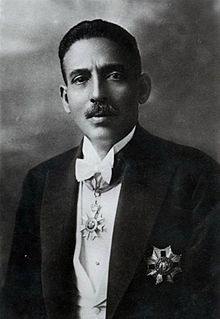1930 Iraqi parliamentary election
[3] He was also concerned that he had too many allies in the British government and had the trust of the High Commissioner, so he made his two loyal men, Nuri al-Said and Jafar al-Askari, join his party and sabotage it.
[5] The MPs objected and filed a complaint to the king, stating that the dissolution of the council violates the law and requesting the appointment of a new neutral ministry.
The key dates were: To guarantee the Sheikhs' loyalty, the government started giving them lands in the outskirts of cities and villages, and threatened to kick its people out if necessary.
[11] On the day of the election, taking advantage of the financial hardship once again, al-Said stated that the relations with London went beyond political affairs and that he succeeded in guaranteeing a sum of more than 50,000,000 rupees to be added to the treasury.
[13] At the same time, the Ministry of Interior summoned the governors that the government doubted their intentions to Baghdad and assigned undersecretaries during the election to, allegedly, hold a meeting that discusses the candidature of the representatives, to make sure that the governors who support the outgoing Minister of Finance who resigned, Ali Jawdat al-Aiyubi, don't switch to the opposition's side.
[14] The government also coordinated with the British via the consultant of the Ministry of Interior who requested from the inspection bodies across the governorates to supply them with lists of the candidates and the possibility of them voting in favor of the treaty, against it, and the dubitable ones.
